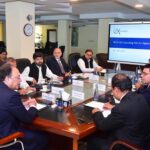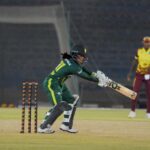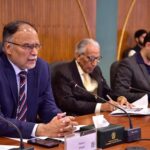WASHINGTON, Sep 09 (APP): Pakistan does not want to see the Taliban-ruled Afghanistan to act as a safe haven for terrorists, and will remain a key partner in the U.S. counterterrorism campaign, Ambassador Asad Majeed Khan said in an interview with The Washington Times published Thursday.“We are on the same side in Afghanistan,” the Pakistani ambassador told the conservative newspaper.
Given the “complex” dynamics in Kabul as the Taliban consolidate power and attempt to govern, he said, the world should give the Taliban a chance to uphold their leaders’ vows to reject terrorism and respect basic rights.
“What we hear very loudly and clearly is the repeated commitments that [Taliban leaders] have made of not allowing the Afghan territory to be used against any country by any terrorist group,” the ambassador said.
During the wide-ranging discussion on Wednesday, Times’ correspondent Guy Taylor said that Ambassador Khan sought to downplay the notion that the Taliban takeover in Kabul amounts to a strategic win for Pakistan.
He said reports that Pakistani military forces deployed to neighbouring Afghanistan to help the Taliban seize the country and that Pakistani military aircraft have assisted the militants in battling anti-Taliban holdouts north of Kabul are “bogus” and “laughable.”
Asked about the recent meeting in Kabul between Lt. Gen. Faiz Hameed, Director General of Pakistan’s Inter-Services Intelligence (ISI), and Taliban leader Mullah Abdul Ghani Baradar, the Pakistani envoy said it was no less normal than the reported meeting last month in Kabul between CIA Director William Burns and Mullah Baradar.
Pakistan was taken aback at how quickly the U.S.-backed government in Kabul fell to the Taliban, though the ambassador said “even the Taliban were surprised.” But, he said any characterization of the group as a proxy for Pakistan would be inaccurate and “unfortunate.”
He pushed back against regional experts’ claims that Pakistan has carefully played both sides of the war in Afghanistan to protect its own interests, saying the risks of blowback to Islamabad’s interests and alliances are too great to have embraced such a strategy. With Afghanistan‘s future deeply uncertain, the developments unfolding in Kabul are “not really a question of anyone’s victory or anyone’s loss.”
“If we are unable to win the peace in Afghanistan, frankly, it will be everyone’s loss, and that’s what we are working for,” he said. “Victories, frankly, in Afghanistan can be temporary and transient if history is to be learned from, and therefore, I think it is only important that there is an inclusive government which represents the diversity of Afghanistan, and I’m sure Taliban are also mindful of that.”
“If things unravel, it will be a loss for everyone. It will be foremost a loss for the people of Afghanistan,” Ambassador Khan said. “A civil war will result in refugee outflows. It will be a loss for the region. And they are not going to just stay in the region. It’s going to spread all across.
So it’s really not our or somebody else’s victory or loss. It’s really a question of whether we are able to put the conflict to an end, whether we are able to achieve peace in Afghanistan.”
How the U.S.-Pakistani relationship will be affected will depend on developments in Afghanistan, the ambassador said.
Ambassador Khan told The Times that Islamabad is eager to enhance its “counterterrorism relationship” with Washington.
“This has always been a key pillar,” he said. “We have worked together in combating the terrorism threat, and there still are threats that we perceive as common threats, and we will continue to work together with the United States in combating those threats.”
With regard to Afghanistan, he said, “I think the U.S.-Pakistan interests are clearly aligned.”
“I am inclined to believe that the United States wants to see peace in Afghanistan.
We certainly want to see peace in Afghanistan. The U.S. doesn’t want Afghanistan to act as a safe haven for terrorists,” the ambassador said. “We definitely don’t want to see Afghanistan act as a safe haven for terrorists.
“The U.S. certainly wants to make it easier for the people of Afghanistan in terms of preserving the gains that have been made, in terms of the social progress that Afghanistan has made. We also would like the Afghan society to preserve the gains that they have made.
We would also not like to see the situation in Afghanistan turn into a civil war or fall apart and avoid a refugee crisis. I think the United States has the same position on that.”
Beyond security, he said, the U.S. is Pakistan’s largest export destination, is one of the top foreign investors in Pakistan and is the third-largest source of remittances to Pakistan.
“The U.S. [also] is home to a very vibrant and influential Pakistani-American diaspora, and then, our military links, our educational links, our cultural links … all these are very, very important contributors to why we should have a strong and close partnership with the United States.”






